
Dennis John Kucinich is an American politician. Originally a Democrat, Kucinich served as U.S. Representative from Ohio's 10th congressional district from 1997 to 2013. From 1977 to 1979, he served a term as mayor of Cleveland, where he narrowly survived a recall election and successfully fought an effort to sell the municipal electric utility before losing his reelection contest to George Voinovich.

George Victor Voinovich was an American politician who served as a United States senator from Ohio from 1999 to 2011. He previously served as the 65th governor of Ohio from 1991 to 1998 and as the 54th mayor of Cleveland from 1980 to 1989, the last Republican to serve in that office.

The mayor of Cleveland is the head of the executive branch of government of the City of Cleveland, Ohio. As the chief executive in Cleveland's mayor–council system, the mayor oversees all city services and is "responsible for enforcing the city charter, city ordinances, and the laws of the State of Ohio." The mayor's office is located at Cleveland City Hall at 601 Lakeside Avenue in Downtown Cleveland. Since 1836, the city has had a total of 54 mayors, including the city's current mayor, Justin Bibb, encompassing 58 mayoral administrations, as four mayors have served in non-consecutive terms.
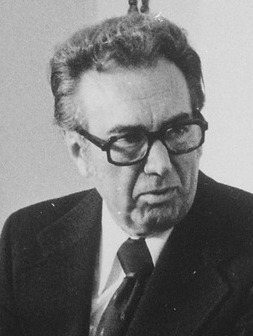
Ralph Joseph Perk was an American politician who served as the 52nd mayor of Cleveland, Ohio from 1971 to 1977.
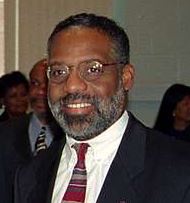
Michael White is an American politician of the Democratic Party and was the 55th and second longest-serving mayor of Cleveland, Ohio encompassing three four-year terms, from 1990 to 2002. He was Cleveland's second African American mayor as well as the city's second youngest mayor.

Richard Duane Hongisto was a businessman, politician, sheriff, and police chief of San Francisco, California, and Cleveland, Ohio.
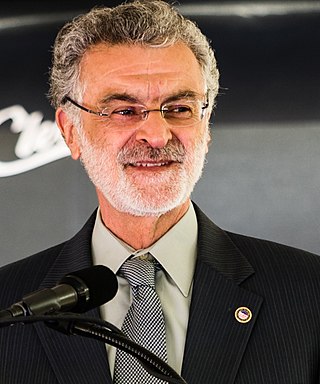
Frank George Jackson is an American lawyer and politician who served as the 57th Mayor of Cleveland, Ohio from 2006 to 2022. He was first elected on November 8, 2005, unseating incumbent Jane Campbell, and re-elected in 2009, 2013, and 2017. Having served four full terms, he is the longest-serving mayor in Cleveland history. On May 6, 2021, he announced he would not seek re-election in 2021.

The written history of Cleveland began with the city's founding by General Moses Cleaveland of the Connecticut Land Company on July 22, 1796. Its central location on the southern shore of Lake Erie and the mouth of the Cuyahoga River allowed it to become a major center for Great Lakes trade in northern Ohio in the early 19th century. An important Northern city during the American Civil War, Cleveland grew into a major industrial metropolis and a gateway for European and Middle Eastern immigrants, as well as African American migrants, seeking jobs and opportunity.
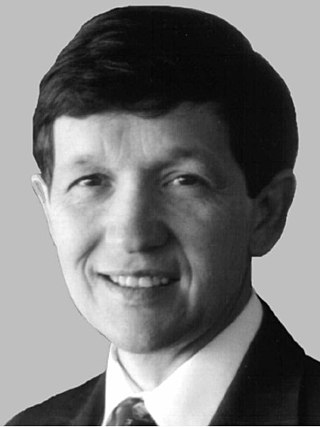
The mayoralty of Dennis Kucinich lasted from November 14, 1977 to November 6, 1979, while he served as the 53rd Mayor of Cleveland, Ohio. The Kucinich administration is often regarded as one of the most tumultuous in Cleveland's history. The mayor relied heavily on confrontation politics, a style that "alienated business and civic leaders, the news media, and, ultimately, even those neighborhood groups that had been his chief supporters." His supporters, however, assert that Kucinich "championed the public good over private-sector rights and pointed to inequities that result when business-centered economic growth is prioritized over neighborhoods. He stood steadfastly for public ownership of utilities in Cleveland."

Joe Cimperman is an American politician who served as a member of the Cleveland City Council, representing near-west side neighborhoods from 1997 to 2016. A Democrat, he had previously been chairman of the Health and Human Services Committee and a member of the Community and Economic Development Committee, Legislation and Public Parks Committee and Property and Recreation Committee.

The Cleveland Division of Police (CDP) is the governmental agency responsible for law enforcement in the city of Cleveland, Ohio.

Anthony Sinagra is an American Republican politician in Cuyahoga County. He was the city prosecutor and mayor of Lakewood, Ohio, and member of the Ohio Senate. He served in the 23rd District, which represented the western suburbs of Cuyahoga County, from 1991 until 1994, when he lost to Dennis Kucinich in an electoral upset. He was also mayor of Lakewood from 1978 to 1990.
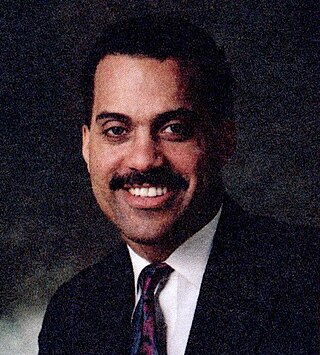
Jeffrey D. Johnson is an American politician and attorney who served as a member of Cleveland City Council for Ward 10 from 2014 to 2018. Johnson served as councilman for Ward 8 from 1984 to 1990 and as a member of the Ohio Senate from 1990 to 1998.

This article is a timeline of the history of the city of Cleveland, Ohio, USA.
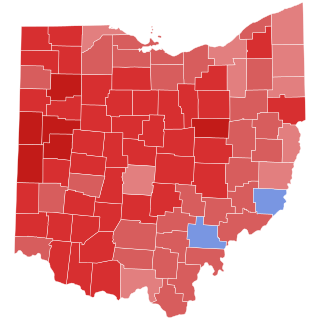
The 2014 Ohio gubernatorial election took place on November 4, 2014. Incumbent Republican Governor John Kasich won reelection to a second term in office by a landslide over Democratic candidate Ed FitzGerald and Green Party candidate Anita Rios. Primary elections were held on May 6, 2014.

The County Executive of Cuyahoga County, the second largest county in Ohio, and the 29th largest county by population in the United States, is the elected chief executive of the Cuyahoga County government. Democrat Chris Ronayne is the current county executive. The county charter stipulates that the executive is responsible for the appointment and removal of county personnel, working with other local governments, introducing legislation to the county council, submitting budgets and capital improvements plans to the council, and many other duties.
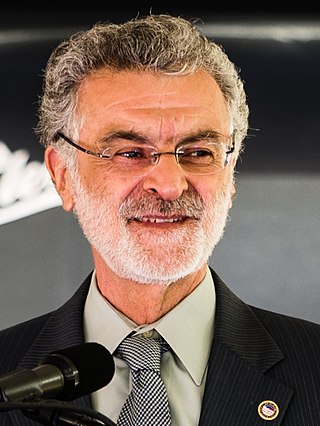
The 2017 Cleveland mayoral election took place on November 7, 2017, to elect the Mayor of Cleveland, Ohio. The election was officially nonpartisan, with the top two candidates from the September 12 primary election advancing to the general election, regardless of party. Incumbent Democratic Mayor Frank G. Jackson won reelection to a fourth term.

The 1979 Cleveland mayoral election took place on November 6, 1979, to elect the Mayor of Cleveland, Ohio. George Voinovich defeated incumbent mayor Dennis Kucinich. The election was officially nonpartisan, with the top two candidates from the October 2 primary advancing to the general election.

The 2021 Cleveland mayoral election took place on November 2, 2021, to elect the Mayor of Cleveland, Ohio. The election was officially nonpartisan, with the top two candidates from the September 14 primary election advancing to the general election, regardless of party. Incumbent Democratic Mayor Frank G. Jackson was eligible to run for reelection to a fifth term, but instead chose to retire. Justin Bibb was elected the 58th mayor of Cleveland in the general election.

The 2022 Cuyahoga County executive election took place on November 8, 2022, to elect the County Executive of Cuyahoga County, Ohio. Incumbent Democratic County Executive Armond Budish was eligible to run for a third term, but instead chose to retire.




















